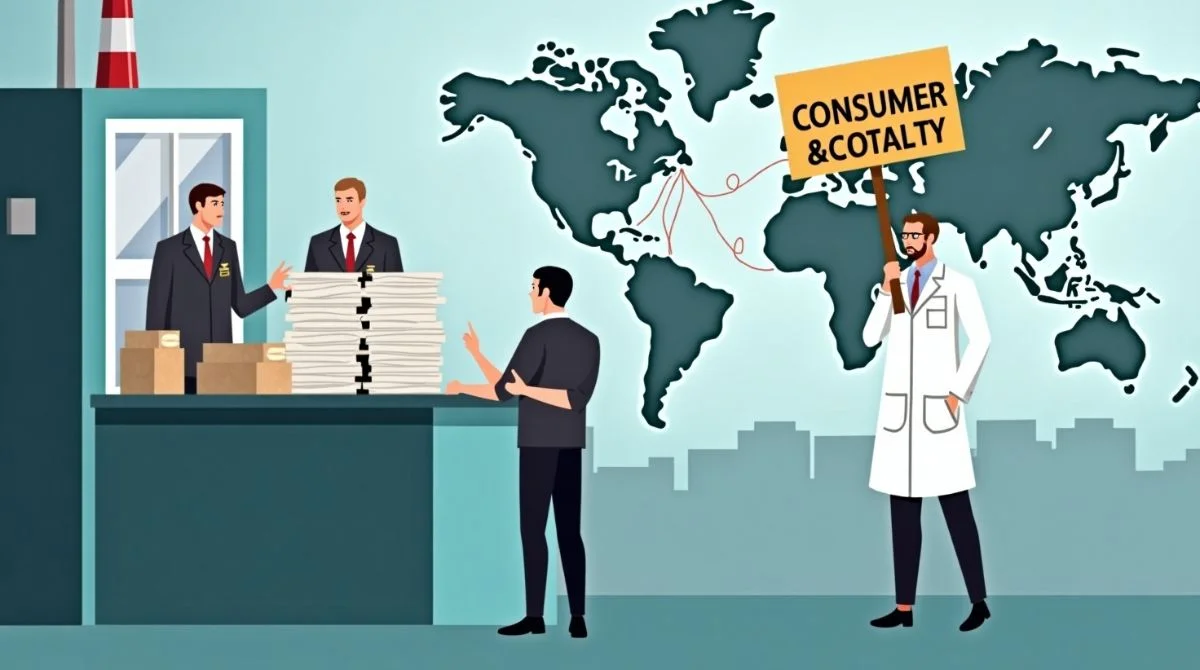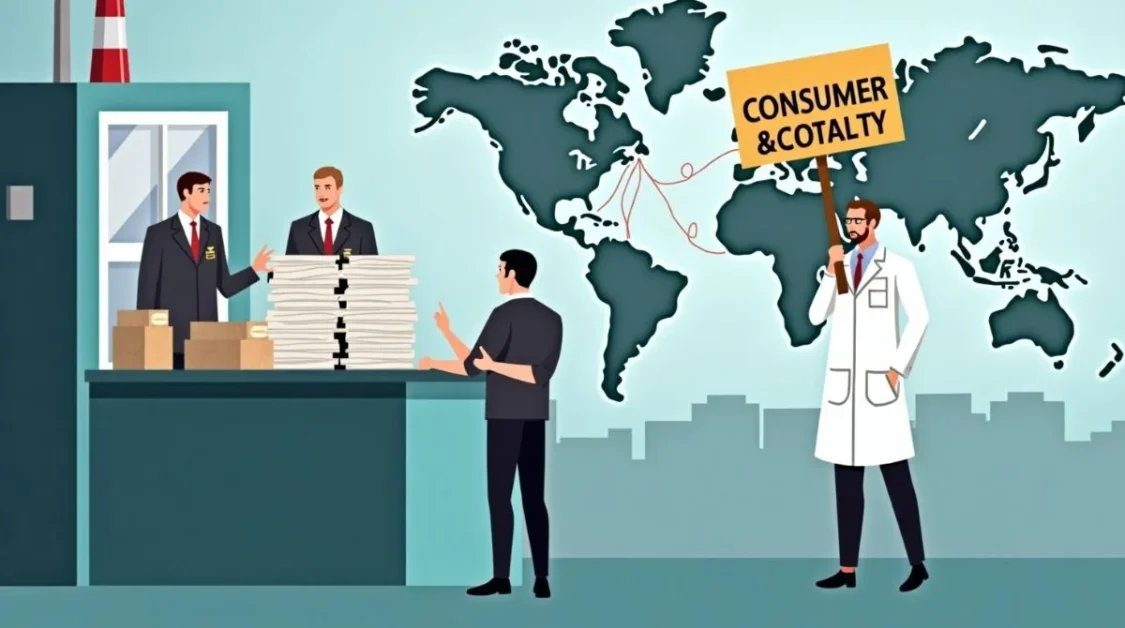What Is a Warning Letter from the FDA?
An FDA warning letter is an official notice that outlines violations of federal law observed during an inspection. It serves as a red flag, notifying the company to correct its actions promptly. It highlights specific issues such as improper manufacturing practices, mislabeling, safety concerns, or unapproved product claims that do not comply with regulations like the Federal Food, Drug, and Cosmetic Act. The letter outlines the problems found and requests a timely response, typically within 15 days, detailing corrective actions to resolve the issues.
While a Warning Letter is not an immediate enforcement action, it serves as a serious notice that the FDA expects compliance. Failure to address the violations can lead to more severe consequences, including product seizures, fines, injunctions, or criminal prosecution. These letters are also made public on the FDA website to maintain transparency and inform consumers.
Why Are Warning Letters Issued?
Warning Letters from the FDA are issued to alert companies or individuals about serious violations that could impact public health and The letter pointed out several infractions of 21 CFR Parts 210 and 211, which govern Current Good Manufacturing Practice (cGMP)
Common Reasons for Warning Letters
- Good Manufacturing Practice (GMP) Violations: Failure to follow proper manufacturing, processing, or packaging procedures that ensure product quality and safety.
- Mislabeling and False Claims: Products marketed with inaccurate, misleading, or unapproved health claims that violate FDA regulations.
- Contamination or Safety Issues: Discovery of contamination in food, drugs, or medical devices that may pose health risks to consumers.
- Failure to Register or Report: Companies not properly registering their products or facilities or failing to report required information to the FDA.
- Data Integrity Problems: Providing incomplete, inaccurate, or falsified data in regulatory submissions or inspections.
Purpose of Warning Letters
- To protect consumers by ensuring products are safe and effective.
- To encourage voluntary compliance with federal laws.
- To provide companies a chance to correct violations before more severe enforcement action
KVK-Tech
1. Company Overview
KVK-Tech is a pharmaceutical company based in Newtown, Pennsylvania. It specializes in manufacturing generic medications, particularly in the areas of pain management and central nervous system (CNS) therapies.
2. Market Presence
KVK-Tech supplies medications across the United States and plays a significant role in making affordable generics available to millions.
Details of the KVK-Tech Warning Letter
KVK-Tech, Inc., a pharmaceutical manufacturer based in Newtown, Pennsylvania, received a significant Warning Letter from the U.S. Food and Drug Administration (FDA) on February 11, 2020, following an inspection conducted from April 9 to April 16, 2019. The letter highlighted multiple violations of Current Good Manufacturing Practice (cGMP) regulations, as outlined in 21 CFR Parts 210 and 211.
Key Violations Identified:
- Inadequate Validation of Test Methods: The company failed to establish and document the accuracy, sensitivity, specificity, and reproducibility of its test methods. This oversight led to undetected out-of-specification (OOS) results for at least one production batch of phentermine HCl capsules.
- Failure to Investigate Discrepancies: KVK-Tech did not thoroughly investigate unexplained discrepancies or the failure of batches to meet specifications, including situations where batches had already been distributed.
- Poor Control Over Computer Systems: There was a lack of appropriate controls over IT systems to ensure that only authorized personnel could make changes to master production and control records.
What Does This Mean for Patients and Healthcare Providers?
1. For Patients
- Potential Risks: Medicines might not be as safe or effective.
- Trust Issues: Patients may question the reliability of their prescriptions.
- Medication Shortages: If KVK-Tech halts production, it could affect supply chains.
2. For Healthcare Providers
- Increased Vigilance: Doctors and pharmacists must closely monitor affected medications.
- Switching Prescriptions: Providers may need to look for alternative drugs.
- More Communication: Extra time spent explaining the situation to concerned patients.
Regulatory Repercussions for KVK-Tech
1. What Happens Next?
- After receiving a warning letter, KVK-Tech is expected to:
- Submit a detailed response explaining how it will address the issues
- Implement corrective and preventive actions (CAPA)
- Possibly undergo follow-up inspections
2. Possible Outcomes:
- Clearance if issues are resolved satisfactorily
- More severe enforcement actions if not
3. These can include:
- Import restrictions
- Consent decrees
- Criminal investigations (in extreme cases)
FDA Warning Letters Affect the Pharma Industry
Industry-Wide Impact
A warning letter to one company can have ripple effects:
- Stricter Oversight: Other companies may face more intense inspections.
- Higher Standards: A push toward improved compliance and transparency.
- Public Pressure: Increased demand for safe, high-quality medications.
Case Studies
- In 2020, Company X received a similar letter and ended up revamping its entire quality assurance department.
- In 2018, Company Y had to recall several batches of its medication following a warning letter.
Key Terms Explained (Quick Glossary)
Here are a few terms across:
- cGMP (Current Good Manufacturing Practices): FDA regulations that ensure drugs are produced consistently and with quality.
- CAPA (Corrective and Preventive Action): A plan to fix and prevent issues.
- Import Alert: A restriction placed on a company’s ability to bring products into the U.S.
Media Coverage and Public Perception
1. How Is the Media Responding?
The media has reported the KVK-Tech warning letter with varying tones, from neutral coverage by medical news outlets to more sensational headlines in the general press. Public awareness has increased as the story has been picked up by national outlets, especially those focused on consumer safety.
2. Impact on Brand Reputation
Negative publicity can erode trust. For KVK-Tech, rebuilding that trust may involve public transparency, regular updates, and demonstrating improved practices. Public perception can often take longer to repair than technical compliance.
Investor Concerns and Financial Implications
Stockholder Reactions
Even though KVK-Tech is a privately held company, warning letters frequently cause a stir among investors, particularly if they have an impact on important business partners or market distribution. These letters signal increased regulatory scrutiny and can shake investor confidence.
Financial Ramifications
- Legal Costs: Defending against regulatory findings and implementing corrections can be expensive.
- Operational Disruptions: Production slowdowns or halts mean loss of revenue.
- Partnership Risks: Distributors or clients may reconsider contracts.
These risks illustrate why regulatory compliance is both a legal and financial priority.
The Role of Whistleblowers in Pharma Regulation
Why Whistleblowers Matter?
Many FDA investigations stem from internal whistleblowers who report unsafe practices. These individuals are vital in protecting public health, especially when management overlooks red flags.
Legal Protections and Rewards
Whistleblowers may be eligible for protections under laws like the False Claims Act and can sometimes receive financial rewards. This incentivizes insiders to speak up and helps ensure transparency.
Encouraging a culture where employees can report issues without fear is crucial for compliance and safety.
KVK-Tech’s Path Forward: A Compliance Roadmap
Following the FDA warning letter, KVK-Tech has entered a critical period of correction and rebuilding. Beyond immediate fixes, the company must adopt a long-term strategy that ensures sustainable compliance and restores its reputation.
1. Commitment to Systemic Change
It’s no longer enough to address surface-level issues. KVK-Tech will need to dig deep into its organizational structure and operating culture. This includes:
- Conducting comprehensive audits of all departments
- Rewriting outdated Standard Operating Procedures (SOPs)
- Training staff regularly on Good Manufacturing Practices (GMP)
- Ensuring accountability at every level, from technicians to top executives
A successful compliance roadmap goes beyond ticking regulatory boxes it embeds quality into the DNA of the organization.
2. Third-Party Involvement
Many companies in similar situations turn to independent consultants or regulatory compliance firms. These third parties help by:
- Offering unbiased assessments
- Providing expertise in FDA regulations
- Recommending industry best practices
Their involvement can also improve credibility in the eyes of the FDA and the public.
3. Transparency and Public Trust
KVK-Tech must maintain an open line of communication with the public. Regular updates on their progress, published responses to FDA findings, and cooperation with media inquiries can go a long way in rebuilding trust.
If executed well, this roadmap could turn a crisis into an opportunity. By choosing to lead with transparency and integrity, KVK-Tech could emerge as a stronger, more responsible pharmaceutical company.
How do Warning Letters Influence Global Pharma Standards?
Although FDA warning letters are U.S.-based actions, their impact often ripples across the global pharmaceutical industry. Regulatory agencies around the world closely monitor FDA decisions, using them as benchmarks to enhance their own standards and protocols.
1. International Regulatory Synchronization
Many countries, especially those that export drugs to the U.S., model their compliance frameworks after the FDA’s. Agencies like the European Medicines Agency (EMA), Health Canada, and the Medicines and Healthcare products Regulatory Agency (MHRA) in the UK frequently align their inspections and standards with FDA guidelines.
This leads to:
- Tighter cross-border oversight
- Mutual recognition agreements
- More rigorous global audits
In short, what happens in one market can set a precedent for many others.
2. Supply Chain Repercussions
A warning letter to a company like KVK-Tech can also disrupt international supply chains. Hospitals, pharmacies, and distributors in other countries may reconsider their sourcing decisions if a manufacturer falls under regulatory scrutiny.
For example:
- Countries may place import restrictions on flagged products
- Global partners might demand additional quality certifications
- Buyers could shift to alternative suppliers to avoid risk
3. Strengthening Global Best Practices
Finally, such regulatory actions promote continuous improvement. Companies outside the U.S. often update their internal policies after high-profile FDA cases to avoid similar outcomes.
In this way, FDA warning letters help push the pharmaceutical industry toward higher safety and quality standards worldwide.
Consumer Advocacy and Pharmaceutical Oversight
In recent years, consumer advocacy has played a growing role in keeping pharmaceutical companies accountable. When issues like the KVK-Tech warning letter become public, watchdog groups and consumer-focused organizations step in to demand answers, accountability, and change.
1. Watchdogs and Nonprofits
Organizations such as Public Citizen, the National Center for Health Research, and other public health watchdogs are known for raising red flags and applying pressure. These groups:
- Track regulatory actions
- Share findings with the public in simple language
- Lobby for stronger laws and oversight
Their involvement ensures that corporate actions remain in public view, not hidden behind legal jargon.
2. Empowered Consumers
Modern consumers are more informed than ever. With easy access to FDA databases, online forums, and social media, patients are becoming vocal advocates for their health. They expect transparency and actively seek:
- Recall information
- Drug safety ratings
- Whistleblower testimonies
- Real-time updates on company investigations
This empowered consumer base holds companies accountable in ways that go beyond regulations.
3. Driving Long-Term Reform
Consumer voices also influence legislative change. By organizing petitions, attending public hearings, and communicating with lawmakers, advocacy groups can:
- Push for stronger penalties
- Demand better labeling and reporting
- Encourage broader whistleblower protections
Together, these efforts contribute to a safer, more transparent pharmaceutical landscape, where companies are not only regulated by authorities but also scrutinized by the people they serve.
Conclusion
In today’s world, the responsibility of keeping pharmaceutical companies in check doesn’t rest solely with government agencies. Public watchdogs, health-focused nonprofits, and empowered consumers all play a powerful role in demanding transparency and accountability. Through collective efforts from monitoring regulations and sharing plain-language findings to advocating for stronger laws, these groups help shape a system where public health comes first. Their vigilance ensures that critical issues don’t stay hidden and that companies are held to a higher standard, not just by law, but by the people they serve.










